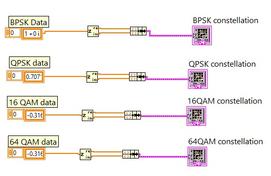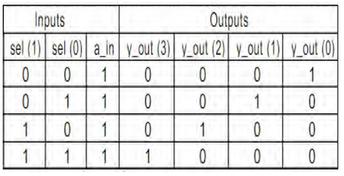16QAM Modulation VHDL Source Code
Advertisement
This page provides the VHDL source code for 16QAM modulation and includes a link to the QAM modulation basics.
VHDL Code
-- library declaration
library IEEE;
use IEEE.STD_LOGIC_1164.ALL;
use IEEE.STD_LOGIC_ARITH.ALL;
use IEEE.STD_LOGIC_UNSIGNED.ALL;
-- entity declaration
entity qam_new_n is
Port (
clk : in std_logic; -- global clock
reset : in std_logic; -- asynchronous active high reset
valid_in : in std_logic; -- when high din is valid
din : in std_logic_vector(3 downto 0); -- data in
dout_rl : out std_logic_vector(15 downto 0); -- real out
dout_ig : out std_logic_vector(15 downto 0); -- imag out
valid_out : out std_logic -- when high real and imag is valid
);
end qam_new_n;
-- architecture declaration
architecture Behavioral of qam_new_n is
signal count : std_logic;
signal dout_rl_s : std_logic_vector(15 downto 0);
signal dout_ig_s : std_logic_vector(15 downto 0);
begin
-- process to map 16 point constellation
process(clk, reset)
begin
if(reset = '1') then
dout_rl_s <= (others => '0');
dout_ig_s <= (others => '0');
count <= '0';
valid_out <= '0';
elsif(clk'event and clk = '1') then
if(valid_in = '1') then
count <= '0';
case din is
when"0000" =>
dout_rl_s <= x"143d"; --x"0051";
dout_ig_s <= x"143d"; --x"0051";
valid_out <= '1';
when"0001" =>
dout_rl_s <= x"143d"; --x"0051";
dout_ig_s <= x"3CB7"; --x"00F2";
valid_out <= '1';
when"0010" =>
dout_rl_s <= x"143d"; --x"0051";
dout_ig_s <= x"EBC3"; --x"FFAE";
valid_out <= '1';
when"0011" =>
dout_rl_s <= x"143d"; --x"0051";
dout_ig_s <= x"C349"; --x"FF0D";
valid_out <= '1';
when"0100" =>
dout_rl_s <= x"3CB7"; --x"00F2";
dout_ig_s <= x"143d"; --x"0051";
valid_out <= '1';
when"0101" =>
dout_rl_s <= x"3CB7"; --x"00F2";
dout_ig_s <= x"3CB7"; --x"00F2";
valid_out <= '1';
when"0110" =>
dout_rl_s <= x"3CB7"; --x"00F2";
dout_ig_s <= x"EBC3"; --x"FFAE";
valid_out <= '1';
when"0111" =>
dout_rl_s <= x"3CB7"; --x"00F2";
dout_ig_s <= x"C349"; --x"FFC3";
valid_out <= '1';
when"1000" =>
dout_rl_s <= x"EBC3";
dout_ig_s <= x"143d"; --x"0051";
valid_out <= '1';
when"1001" =>
dout_rl_s <= x"EBC3"; --x"FFAE";
dout_ig_s <= x"3CB7"; --x"00F2";
valid_out <= '1';
when"1010" =>
dout_rl_s <= x"EBC3"; --x"FFAE";
dout_ig_s <= x"EBC3"; --x"FFAE";
valid_out <= '1';
when"1011" =>
dout_rl_s <= x"EBC3"; --x"FFAE";
dout_ig_s <= x"C349"; --x"FF0E";
valid_out <= '1';
when"1100" =>
dout_rl_s <= x"C349"; --x"FF0E";
dout_ig_s <= x"143d"; --x"0051";
valid_out <= '1';
when"1101" =>
dout_rl_s <= x"C349"; --x"FF0E";
dout_ig_s <= x"3CB7"; --x"00F2";
valid_out <= '1';
when"1110" =>
dout_rl_s <= x"C349"; --x"FF0E";
dout_ig_s <= x"EBC3"; --x"FFAE";
valid_out <= '1';
when"1111" =>
dout_rl_s <= x"C349"; --x"FF0E";
dout_ig_s <= x"C349"; --x"FF0E";
valid_out <= '1';
when others =>
null;
end case;
else
dout_rl_s <= (others => '0');
dout_ig_s <= (others => '0');
valid_out <= valid_in;
end if;
end if;
end process;
dout_rl <= dout_rl_s;
dout_ig <= dout_ig_s;
end Behavioral;
Advertisement
 RF
RF

